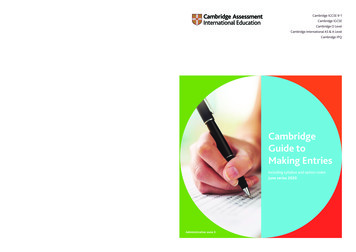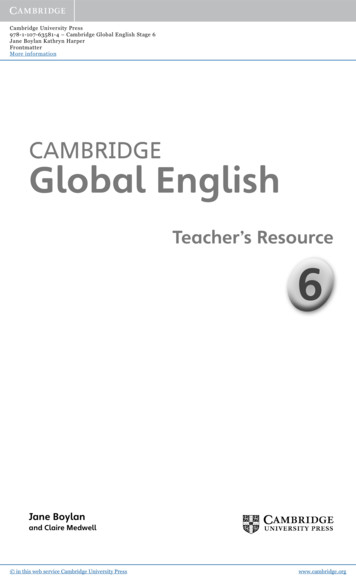Cambridge Pre-AICE English Summer Assignment
Cambridge Pre-AICE English9th & 10th Grade - Summer AssignmentDear student,Congratulations on your decision to enter the Cambridge Program! We are truly looking forwardto working with you as well as helping you achieve your potential as sharp readers, strong writers,and critical thinkers throughout the 2017- ‐2018 school year.Below, you will find your summer reading assignment. Please note the due date for all work isFriday, August 18th. The purpose of this summer work is to prepare you for the coursework anddeep thinking that lies ahead. Your work will also allow your teacher to see how you think,analyze, and write. Please complete these assignments to the best of your ability and please let usknow if you have any questions.Also, please be aware that the college- ‐level literature we are reading may contain maturesituations. If at any time you feel uncomfortable with a text we are studying, please contact yourteacher for an alternative title. These summer assignments are modified from other Cambridgeteachers, ensuring that you will be prepared to advance throughout the Cambridge Program!We look forward to a great year!Mrs. Jessica LanserMs. Ashley FeyedelemPre- ‐AICE LanguageEmail: jpiazza@pasco.k12.fl.usPre- ‐AICE LiteratureEmail: ---Memoir Selection - Due: Friday, August 18thSelect ONE memoir for your summer reading. A memoir, by definition, covers a specific period of time orexperience within a person’s life. It is non-fiction and gives a glance into the life and experiences ofanother real person. You may select any memoir that you have not previously read. We will includeexamples on the following page, but you are welcome to go beyond this list. If you’re concerned, you canemail your teacher about your selection for approval.If you purchase or find your own copy, please make annotations throughout the text while you read. Ifyou do not purchase your own copy, keep paper - lined notebook paper or sticky notes - with you to jotdown your thoughts as they happen. Keep your notes specific so you can link your thinking directlyback to the text itself. This skill will be something we will practice all year! Please also note some of thetexts listed below can be found, in full, online.
Below, you will find memoir examples. Feel free to research a memoir that most appeals to you - and one that youwill enjoy reading!I am Malala by Malala YousafzaiThe Glass Castle by Jeanette WallsNight by Elie WeiselThe Diary of a Young Girl by Anne FrankFunny in Farsi by Faroozeh DumasA Long Way Home by Ishmael BeahThis Star Won’t Go Out by Ester EarlLaughing at My Nightmare by Shane BurcawSoul Surfer by Bethany HamiltonNo Summit out of Sight by Jordan RomeroThe Boy on the Wooden Box by Leon LeysonMemoir Selection Assignments1. READ your book carefully. While reading, feel free to make annotations to illustrate your thinking.Good annotations (or notes) tend to enhance comprehension and retention of ideas. If annotating is newto you: don’t make it harder than it is! Annotations should be marks of moments that stand out, timeswhere you question ideas, note examples of growth or change in characters, or even identify descriptionsthat are particularly well written. Annotations should be handwritten (either in a book itself, on stickynotes in a book, or on separate paper).2. Rhetorical Triangle Worksheets. The Rhetorical Triangle is a tool used to help you understand andanalyze writing. It looks at three critical components and how they interact in a text. Complete the fourworksheets (see following pages) by filling in information as indicated. You are welcome to type orneatly handwrite these assignments. You are also welcome to change the format of each assignment, aslong as the assignment is clear and includes all of the information required.Note: your work on these worksheets will be used to complete in-class assignments, includingtimed writings and discussions. Choose thoughtful quotes from throughout the memoir so youhave a variety of moments and ideas to refer to.3. Quote Response Paragraphs. Specific directions for the quote response assignment can be found onthe last page of the summer reading assignment. Please type quote response assignments in MLA format(double space all writing, use Times New Roman font, in size 12). If you cannot type this assignment,please let your teacher know as soon as possible.
Rhetorical Triangle Worksheet 1SPEAKER: As you read, look for details that help to develop the Speaker, in this case - the central figureof the memoir, or the author. List 20 key details about the Speaker below, pulling direct quotes fromthe memoir that tell us about the author. In each box, include one quote and its page number(s).
Rhetorical Triangle Worksheet 2AUDIENCE: As you read, think about the intended audience for this memoir. Who exactly does theSpeaker hope to reach? Did he/she write primarily to satisfy him or herself? Or is the speaker explainingto a particular group how or why certain decisions were made? Is the memoir for a general audience,possibly of a particular age or generation? Is the target audience primarily to men, women, or both? Isthis speaker writing to people who basically agree with him/her, or to convince those who do not?Consider these questions and write your ideas on Audience below. Include 10 direct quotes that seemto exemplify who the intended audience is and why. In each box, you should include one quote and itspage number(s).
Rhetorical Triangle Worksheet 3MESSAGE: Every communication has a message. Sometimes we call it the theme, or the main idea.Often we find more than one. As you read, try to identify a minimum of five possible Messages of thismemoir. List your ideas as complete sentences below (there is room for 8, though 5 is all that isrequired). If you can include a specific quote or moment to support your ideas, please include it.
Rhetorical Triangle Worksheet 4USE OF LANGUAGE: As you read, think about how the author uses language. Try to identify 20instances of figurative language used (personification, symbol, metaphor, simile, hyperbole) and thinkabout what each instance adds to the text. Think about particular diction, or word choices, that seemeffective or important, too. In each box below, list one example of figurative language or striking dictionused, including the page number.
Memoir Quote Response Paragraphs1. Choose two important and or interesting quotes from the memoir, roughly one from the firsthalf, and the other from the second half. Look for critical passages that convey the essence of thetext or the author/central character. Your choices can be up to approximately three paragraphsbut no more than one page in length.To help you get started, you may want to use the following questions to select passages andgenerate ideas:Ø Why does the passage impress, intrigue, horrify, or puzzle you?Ø Do you find the author’s use of language appealing or powerful? Does the passage jumpØ Ø Ø Ø Ø Ø Ø Ø Ø off the page as great description?Does the passage prompt a strong response from you as you read it? Does it present itselfas so well-crafted that you just love the sound of it? Is the language beautiful, descriptive,graphic, or something else?Is the passage particularly meaningful, to you and your feelings and emotions, or to theauthor/central character?Do you find yourself in agreement/disagreement with the ideas expressed?Does the passage remind you of a situation you have lived as well?Does the passage make you laugh out loud? Melancholy? Something else?Does the author raise intriguing questions or issues?Does the passage challenge or expand your thinking?Does the passage provide particular insight into the development of the author, speaker,or another central figure?Does the passage reflect the specifics of the time and/or place of the narrative?2. For each passage, write a well-developed paragraph that discusses the importance of thepassage to the memoir and explains why you selected it. Each response paragraph should beapproximately 15 sentences in length, should include specific supporting details and/or quotes,and should be organized around a central idea.Though this is not a full essay, we are expecting you to engage in analytical thinking and anorganized writing process. This should include:ü Prewrite – this is done in your selection of meaningful quotes and in the jotting down ofideas while reading to grow your understandingü Write a draft of each response paragraphü Revise carefully—remember this is the first writing your teacher will see from you. Usecarefully chosen diction and make sure your sentences sound smooth. Check your logicand organization. Of course, proofread your work so you wow us!ü Type your final copy with the full passage at the top, including page numbers. Yourwriting should then be double spaced, in Times New Roman, 12 point font.
Memoir Selection - Due: Friday, August 18th Select ONE memoir for your summer reading. A memoir, by definition, covers a specific period of time or experience within a person’s life. It is non-fiction and gives a glance into the life and experiences of another real person. You may select any memoi
Cambridge AICE Art & Design 1 AS Level . 0101371 AICE ART&DESIGN 2 AL 3/Y PF 1.0 ART ED @4 ART 6 . Cambridge AICE Art & Design 2 A Level . 0101375 PRE-AICE ART&DES3DIG 3/Y PF 1.0 ART ED @4 ART 6 . Cambridge AICE Art & Design: 3D . Studies IGCSE Level . 0101440 FIN CFT STUD ART 1 2/Y
Cambridge Advanced International Certificate of Education (Cambridge AICE) is a group certificate which requires learners to study subjects drawn from three curriculum areas within Cambridge International AS & A Level: mathematics and science, languages, and arts and humanities. There is also a compulsory core subject, Cambridge International .
Cambridge International Advanced Level (A Level) Cambridge International Project (CIPQ) Cambridge International Certificate of Education (ICE Diploma) Cambridge Advanced International Certificate of Education (AICE Diploma) Cambridge Checkpoint and Cambridge Primary Checkpoint qualifications are part of the May 2020 series.
Cambridge University Press 978-1-107-63581-4 – Cambridge Global English Stage 6 Jane Boylan Kathryn Harper Frontmatter More information Cambridge Global English Cambridge Global English . Cambridge Global English Cambridge Global English
Cambridge Lower Secondary Programme High School Benefits Continued The Cambridge AICE Diploma (or Cambridge Advanced International Certificate of Education) is an internationally recognized diploma awarded to students for the satisfactory completion of a series of academically rigorous courses specific to AICE in high school.
Earn at least 1 credit in AP, IB, AICE or a dual enrollment course. A student is exempt from the Biology I or U.S. History assessment if the student is enrolled in an AP, IB or AICE Biology I or U.S. History course and the student ! Takes the respective AP, IB or AICE assessme
Earn at least 1 credit in AP, IB, AICE or a dual enrollment course. A student is exempt from the Biology I or U.S. History assessment if the student is enrolled in an AP, IB or AICE Biology I or U.S. History course and the student ! Takes the respective AP, IB or AICE assessme
28 AICE, Vasundhara sec. 6 38 — — 29 AICE, Mayur Vihar 39 — — 30 AICE, Noida























